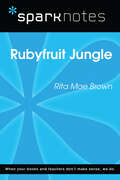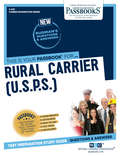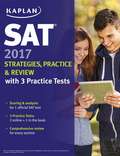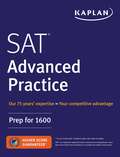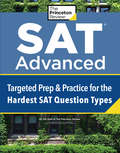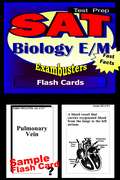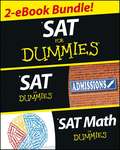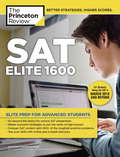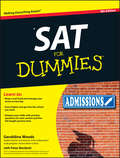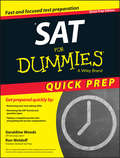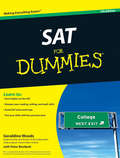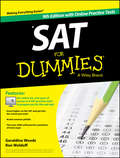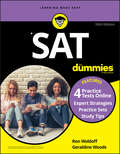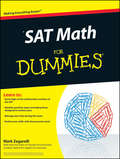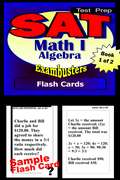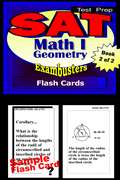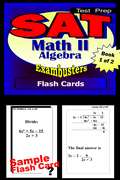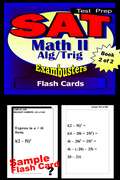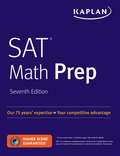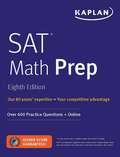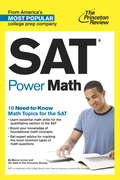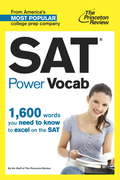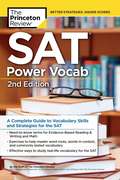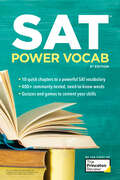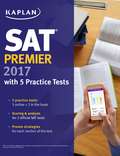- Table View
- List View
Rubyfruit Jungle (SparkNotes Literature Guide Series)
by SparkNotesRubyfruit Jungle (SparkNotes Literature Guide) by Rita Mae Brown Making the reading experience fun! Created by Harvard students for students everywhere, SparkNotes is a new breed of study guide: smarter, better, faster. Geared to what today's students need to know, SparkNotes provides: *Chapter-by-chapter analysis *Explanations of key themes, motifs, and symbols *A review quiz and essay topicsLively and accessible, these guides are perfect for late-night studying and writing papers
Rural Carrier: Passbooks Study Guide (Career Examination Series)
by National Learning CorporationThe Rural Carrier (U.S.P.S.) Passbook® prepares you for your test by allowing you to take practice exams in the subjects you need to study. It provides hundreds of questions and answers in the areas that will likely be covered on your upcoming exam.
SAT 2017 Strategies, Practice & Review with 3 Practice Tests: Online + Book
by KaplanNow that the College Board's new SAT is in effect, you can face the redesigned test with confidence using SAT 2017 Strategies, Practice & Review. This essential guide provides brand new practice tests, clear explanations of test changes, detailed concept review, and much more. SAT 2017 Strategies, Practice & Review is the ideal prep tool for students looking to ace the redesigned test!SAT 2017 Strategies, Practice & Review includes: * 3 realistic practice tests for the new SAT: 1 in the book, 2 online * In-depth review of the new Evidence-Based Reading and Writing section and the new Optional Essay * In-depth review of all Math topics tested in the new SAT, including analysis of data, charts, and graphs * Scoring, analysis, and explanations for 1 official SAT Practice Test * Explanations of the new SAT scoring systems, including Area Scores, Test Scores, Cross-Test Scores, and Subscores * Hundreds of practice questions with clear, detailed answersThe SAT guide you want to prep with to score higher--we guarantee a higher score!
SAT Advanced Practice: Prep for 1600
by Kaplan Test PrepIf you're looking to get a top score on the SAT, Kaplan's SAT Advanced Practice workbook has the high-difficulty practice and expert strategies you need to face the toughest questions with confidence.Essential PracticeSeven practice sets with advanced, high-difficulty questions to help you score the most pointsMore than 700 questions with detailed answers and explanationsKaplan's exclusive score-raising strategies and methods show you the best way to attack the most difficult SAT questionsComprehensive review of all sections on the testExpert GuidanceWe know the test: Our Learning Engineers have put tens of thousands of hours into studying the SAT – using real data to design the most effective strategies and study plans.Kaplan's expert psychometricians make sure our practice questions and study materials are true to the test.We invented test prep—Kaplan (www.kaptest.com) has been helping students for almost 80 years, and more than 95% of our students get into their top-choice schools. Our proven strategies have helped legions of students achieve their dreams.
SAT Advanced: Targeted Prep & Practice for the Hardest SAT Question Types (College Test Preparation)
by The Princeton ReviewADVANCE YOUR SAT SCORE TO THE NEXT LEVEL.Have a strong SAT score but looking to push your performance even further? The Princeton Review is here for you! SAT Advanced is your go-to guide for the extra-challenging topics that other books don't cover. Offering exclusive tips and strategies, this book guides you through the most difficult questions you'll find on the SAT.Inside you'll:• Learn advanced strategies to ace all three sections of the test: Reading, Writing and Language, and Math • Master the complex content needed to help score higher • Test your readiness with drills covering the exam's toughest concepts • Access a full-length practice SAT online
SAT Biology E/M Test Prep Review: Exambusters Flash Cards and SAT II Exam Study Guide (Exambusters SAT 2 #1)
by Ace Inc.<P><P><i>Advisory: Bookshare has learned that this book offers only partial accessibility. We have kept it in the collection because it is useful for some of our members. Benetech is actively working on projects to improve accessibility issues such as these.</i><P><P> SAT BIOLOGY E/M Study Guide:<P><P> 450 questions and answers. Essential definitions and concepts. Topics: Cells, Biochemistry and Energy, Evolution and Classification, Kingdoms: Bacteria, Fungi, Protista; Kingdom: Plantae, Kingdom: Animalia, Human Locomotion, Human Circulation and Immunology, Human Respiration and Excretion, Human Digestion, Human Nervous System, Human Endocrinology, Reproduction and Development, Genetics, Ecology. <P> EXAMBUSTERS SAT II Prep Workbook:<P> Provides comprehensive SAT II review--one fact at a time--to prepare students to take practice SAT II tests. Each SAT II study guide focuses on fundamental concepts and definitions--a basic overview to begin studying for the SAT II exam. Up to 600 questions and answers, each volume in the SAT II series is a quick and easy, focused read. Reviewing SAT II flash cards is the first step toward more confident SAT II preparation and ultimately, higher SAT II exam scores!
SAT Bundle For Dummies
by Geraldine Woods Mark Zegarelli Kristin Josephson Peter BonfantiTwo complete ebooks for one low price! Created and compiled by the publisher, this SAT bundle brings together two of the bestselling For Dummies SAT guides in one, e-only bundle. With this special bundle, you'll get the complete text of the following titles: SAT For Dummies, 8th Edition Whether you are a student struggling with math, reading, or writing essays, this updated edition of SAT For Dummies offers advice for tackling the toughest questions, as well as hints and tips for making the most of the time available to complete each section. SAT For Dummies is packed with 5 full-length practice tests with detailed answers and explanations, review of foundational concepts for every section, from identifying root words and using commas correctly to solving math word problems and using the quadratic formula. SAT For Dummies gives you the edge you need to successfully achieve the highest score possible! SAT Math For Dummies Scoring well on the mathematics section of the SAT exam isn't guaranteed by getting good grades in Algebra and Geometry. Turn to SAT Math For Dummies for expert advice on translating your classroom success into top scores. Loaded with test-taking strategies, two practice tests, and hundreds of problems with detailed solutions and explanations, SAT Math For Dummies helps you maximize your scores in no time About the Authors of SAT For Dummies, 8th Edition Geraldine Woods has prepared students for the SAT, both academically and emotionally, for the past three decades. She also teaches English and directs the independent-study program at the Horace Mann School in New York City. She is the author of more than 50 books, including English Grammar For Dummies, 2nd Edition; English Grammar Workbook For Dummies, 2nd Edition; Grammar Essentials For Dummies; Research Papers For Dummies; College Admission Essays For Dummies; AP English Literature and AP English Language & Composition For Dummies, all published by Wiley. She lives in New York City with her husband and two parakeets. Peter Bonfanti has taught high school math in New York City since 1996. Before that, he lived in Pennsylvania and was a monk. Before that, he went to school in New Jersey, where he was born and hopes to return someday. Kristin Josephson survived the college admissions process only to drop out of MIT 16 months later to attend circus school in San Francisco. While there, she studied flying trapeze, trampoline, and acrobatics. Kristin discovered her passion for teaching while she was tutoring in the Bay Area, a passion that led her to complete her degree at Colorado College. Kristin eventually landed at the Horace Mann School, where she has been teaching high school mathematics since 2007 About the Author of SAT Math For Dummies Mark Zegarelli holds degrees in math and English from Rutgers University. He is a math tutor and writer with over 25 years of professional experience. Zegarellli has written numerous Dummies books, including LSAT Logic Games For Dummies and Basic Math & Pre-Algebra Workbook For Dummies
SAT Elite 2400
by Princeton ReviewGo beyond the basics for serious SAT preparation.The Princeton Review's SAT Elite 2400 is designed specifically for advanced students who already feel confident on the exam, but want to push themselves toward that perfect SAT score. This book will help you: · Conquer SAT content with 400+ of the toughest practice problems· Master effective strategies to beat the test and hit your top score · Learn specialized tactics to avoid the trick questions that trap most students· Join the ranks of high-scorers with a strategic exam approach· Train yourself to use alternative approaches that enable you to tackle the hardest questions with confidence· Feel confident in your grasp of SAT content with intensive Math, Reading, and Writing reviewsWith detailed answers and explanations for each question, SAT Elite 2400 will help you take your score into the big leagues (say, the Ivy league). It gives you exclusive tips & strategies for tackling the hardest questions on the SAT, pacing guidelines push you to a top score, and tons of challenging practice material to help get you into top test-taking shape.
SAT For Dummies
by Geraldine Woods Kristin Josephson Peter BonfantiThe easy way to score your highest on the SATWhether you are a student struggling with math, reading, or writing essays, this updated edition of SAT For Dummies offers advice for tackling the toughest questions, as well as hints and tips for making the most of the time available to complete each section. You'll get the information you need to focus on the areas that are most problematic for you to ensure that you achieve the best possible score. SAT For Dummies is for the millions of students who are preparing to take the SAT as part of the college application process. The SAT consists of nine separate, timed sections, which are broken down into 3 categories: Reading, Mathematics, and Writing. This new edition of SAT For Dummies gives students the tools, tips, and test-taking strategies to overcome anxiety on any (and every) part of the test.5 full-length practice tests with detailed answers and explanationsReview of foundational concepts for every section, from identifying root words and using commas correctly to solving math word problems and using the quadratic formulaComplete explanations of every question typePractice questions for each of the test's 9 sectionsSAT For Dummies gives you the edge you need to successfully achieve the highest score possible!
SAT For Dummies
by Geraldine Woods Ron WoldoffThe fast and easy way to score higher on the SAT Does the thought of preparing for the SAT cause you to break out in a cold sweat? Have no fear! SAT For Dummies, Quick Prep Edition gives you a competitive edge by fully preparing you for the SAT. Written in a friendly and accessible style, this hands-on guide will help increase your chance of scoring higher on the redesigned SAT test being launched by the College Board in 2016. The SAT is administered annually to more than two million students at approximately 6,000 world-wide test centers. Nearly every college and university in America looks at a student's SAT exam score or SAT Subject Tests as a part of its admissions process. Your SAT score is nothing to sniff at--in addition to admissions, many schools use these results for course placement. With the help of this guide, you'll maximize your chances of gaining entrance to the college of your dreams--as well as a seat in the best classes. So what are you waiting for? Start practicing your way to a better SAT score today! Includes coverage of SAT question types and formats Offers practice SAT tests with full answer explanations Helps pinpoint where you need more help Reflects the College Board's new and updated SAT exam for 2016 Whether you're preparing for the SAT for the first time or retaking the exam to improve your score, SAT For Dummies, Quick Prep Edition sets you up for success.
SAT For Dummies
by Geraldine WoodsThis new edition of The SAT For Dummies gives you the information you need to focus on those areas that are most problematic and to ensure that you achieve the best possible score. Whether you're struggling with math, reading, or writing essays, this updated guide offers advice for tackling the toughest questions, as well as hints and tips for making the most of the time available to complete each section. Features four full-length practice tests (two more than prior editions) with detailed answers and explanations Provides reviews of foundational concepts for every section, from identifying root words and the correct use of commas to solving math word problems and using the quadratic formula Includes complete explanations for every question type and practice problems for every section of the test The SAT For Dummies gives you the edge you need to successfully achieve the highest score possible!
SAT For Dummies, with Online Practice
by Geraldine Woods Ron WoldoffThe easy way to prepare for the SAT The College Board has announced a redesign to the SAT in the spring of 2016. There's no doubt that students, parents, and educators are clamoring for a revised and authoritative resource on the latest iteration of this important standardized test. Packed with loads of concept review and practice questions that cover everything you can expect to encounter on the math, reading, and writing sections--and complemented with one-year access to additional SAT practice online--this 2016/2017edition of SAT For Dummies covers everything you need to increase your chances of scoring higher and getting into the college of your dreams. The SAT is administered annually to more than 2 million students at approximately 6,000 test centers located in more than 170 countries. Nearly every college in America accepts the SAT or SAT Subject Test as part of its admission process. Written by veteran For Dummies author and test preparation guru Geraldine Woods, 2016/2017 SAT For Dummies breaks down the topics covered on the redesigned SAT into easily digestible parts and gives you ample practice opportunities to pinpoint where you need more help and go on to master every subject. Offers strategies to stay focused on SAT test day Helps you gauge how you measure up as you prepare for the SAT Includes tips on how to manage your time wisely Provides practice problems and exercises in print and digital formats to take your skills to the next level If the thought of preparing for the SAT makes you sweat, fear not! 206/2017 SAT For Dummies takes the intimidation out of the exam and arms you with the confidence and know-how you need to make it your minion.
SAT For Dummies: Book + 4 Practice Tests Online
by Geraldine Woods Ron WoldoffGet ready to own the SAT! The most surefire way to ace the SAT is to show up on exam day with calm confidence, ready to own the test. To do that, you need to prepare—you should know what to expect and plan accordingly. The SAT assesses what you’ve covered in high school, so the best way to prepare is with a systematic content refresher, some solid study strategies, and plenty of practice, practice, practice. The proven tools and techniques in SAT For Dummies help you do just that and get you ready to take – and take down – the SAT. In a friendly, step-by-step style, SAT For Dummies goes beyond simply rehashing what you’ve learned (and forgotten!) In school and applies your learning to the test itself, with examples for every question type, tips for answering questions quickly, advice on guessing, and pitfalls to avoid. The study questions and practice exams are designed to build your skills, identify areas that need extra work, and develop your confidence for the big day. Know how to answer for a higher score Acquire killer techniques for math and essay questions Access four full-length practice exams online Study key SAT vocabulary words Succeeding on the SAT is like handling any other task—if you know what to do and get plenty of practice, you’ll be fine. This book shows you how it’s done.
SAT Math For Dummies
by Mark ZegarelliManage your time and ace the mathematics section of the SAT Scoring well on the mathematics section of the SAT exam isn't guaranteed by getting good grades in Algebra and Geometry. Turn to SAT Math For Dummies for expert advice on translating your classroom success into top scores. Loaded with test-taking strategies, two practice tests, and hundreds of problems with detailed solutions and explanations, SAT Math For Dummies helps you maximize your scores in no time. Review key math concepts and then step through example and sample problems and solutions presented in the same multiple choice and grid-in formats you'll experience on the SAT Offers an expert review of core mathematic concepts as well as ample opportunity for practice Improve important skills such as estimation and number sense SAT Math For Dummies gives you expert tips on how to make the best use of the limited time allowed and get your best possible score!
SAT Math Level I Test Prep Review--Exambusters Algebra Flash Cards--Workbook 1 of 2: Math Level I - Algebra (Exambusters SAT II Workbook #1 of 2)
by Sat Ii Exambusters450 questions and answers. Essential definitions, formulas, concepts, and sample problems.<P><P> Topics: Sets, Variables, Exponents, Properties of Numbers, Like Terms, Simple Equations, Property of Equality, Signed Numbers, Monomials, Polynomials, Advanced Equations, Verbal Problems, Factoring Polynomials, Algebraic Fractions, Equations with Several Variables, Advanced Verbal Problems, Evaluating Formulas, Simultaneous Equations, Ratio and Proportion, Variation, Quadratic Equations and Radicals, Coordinate Geometry <P>Exambusters SAT Prep Workbooks provide comprehensive, fundamental SAT review--one fact at a time--to prepare students to take practice SAT tests. Each SAT study guide focuses on one specific subject area covered on the SAT exams. From 300 to 600 questions and answers, each volume in the SAT series is a quick and easy, focused read. Reviewing SAT flash cards is the first step toward more confident SAT preparation and ultimately, higher SAT exam scores!
SAT Math Level I Test Prep Review--Exambusters Geometry Flash Cards--Workbook 2 of 2: Math Level I - Geometry (Exambusters SAT II Workbook #2 of 2)
by Sat Ii Exambusters450 questions and answers. Essential definitions, formulas, and concepts with complementary diagrams. <P><P>Topics: Lines and Angles, Triangles, Introduction to Proofs, Congruent Triangles, Perpendicular Lines, Parallel Lines, Angle Sums, Quadrilaterals, Medians, Altitudes, Bisectors, Circles, Ratio and Proportion, Similar Polygons, Proportions in Right Triangles, Areas of Polygons, Circles and Regular Polygons, Inequalities, Locus, Introduction to Coordinate Geometry <P>Exambusters SAT Prep Workbooks provide comprehensive, fundamental SAT review--one fact at a time--to prepare students to take practice SAT tests. Each SAT study guide focuses on one specific subject area covered on the SAT exams. From 300 to 600 questions and answers, each volume in the SAT series is a quick and easy, focused read. Reviewing SAT flash cards is the first step toward more confident SAT preparation and ultimately, higher SAT exam scores!
SAT Math Level II Test Prep Review--Exambusters Algebra 1 Flash Cards--Workbook 1 of 2: Math Level II - Algebra (Exambusters SAT II Workbook #1 of 2)
by Sat Ii Exambusters450 questions and answers. Essential definitions, formulas, concepts, and sample problems.<P><P> Topics: Sets, Variables, Exponents, Properties of Numbers, Like Terms, Simple Equations, Property of Equality, Signed Numbers, Monomials, Polynomials, Advanced Equations, Verbal Problems, Factoring Polynomials, Algebraic Fractions, Equations with Several Variables, Advanced Verbal Problems, Evaluating Formulas, Simultaneous Equations, Ratio and Proportion, Variation, Quadratic Equations and Radicals, Coordinate Geometry <P>Exambusters SAT Prep Workbooks provide comprehensive, fundamental SAT review--one fact at a time--to prepare students to take practice SAT tests. Each SAT study guide focuses on one specific subject area covered on the SAT exams. From 300 to 600 questions and answers, each volume in the SAT series is a quick and easy, focused read. Reviewing SAT flash cards is the first step toward more confident SAT preparation and ultimately, higher SAT exam scores!
SAT Math Level II Test Prep Review--Exambusters Algebra 2-Trig Flash Cards--Workbook 2 of 2: Math Level II - Algebra/Trigonometry (Exambusters SAT II Workbook #2 of 2)
by Sat Ii Exambusters500 questions and answers that focus on essential advanced algebra and trigonometry concepts. Includes complementary diagrams. Essential definitions, formulas, and sample problems. <P><P>Topics: Exponents and Radicals, Absolute Values and Inequalities, Polynomials, Linear Equations, Quadratic Equations, Conic Sections, Logarithms, Angles, Trigonometric Functions and Identities, Oblique Triangles, Complex and Imaginary Numbers, Area and Volume, Sequences and Series <P>Exambusters SAT Prep Workbooks provide comprehensive, fundamental SAT review--one fact at a time--to prepare students to take practice SAT tests. Each SAT study guide focuses on one specific subject area covered on the SAT exams. From 300 to 600 questions and answers, each volume in the SAT series is a quick and easy, focused read. Reviewing SAT flash cards is the first step toward more confident SAT preparation and ultimately, higher SAT exam scores!
SAT Math Prep
by Kaplan Test PrepPrepare for the SAT with confidence! With more than 75 years of experience and more than 95% of our students getting into their top-choice schools, Kaplan knows how to increase your score and get you into your top-choice college! Prep Smarter. Not Harder. Kaplan’s SAT Math Prep provides everything you need to master the challenging Math on the SAT! It reviews every concept from basic Algebra to Advanced Trig and will help you focus your studies on the most important math topics to increase your score! This focused guide includes in-depth coverage of every math concept tested on the SAT as well as effective score-raising methods and strategies for building speed and accuracy from Kaplan’s top math experts. Kaplan’s SAT Math Prep contains many essential and unique features to help improve test scores, including: * 16 comprehensive Math Practice Sets with detailed explanations * More than 250 practice questions with expert explanations * Methods and Strategies to improve your Math score * Techniques for Multiple Choice, Grid-In, and Extended Thinking questions * Review of important Math Concepts Kaplan provides you with everything you need to improve your Math score and get into your top-choice college!
SAT Math Prep: Over 400 Practice Questions + Online (Kaplan Test Prep)
by Kaplan Test PrepPrepare for the SAT with confidence! With more than 75 years of experience and more than 95% of our students getting into their top-choice schools, Kaplan knows how to increase your score and get you into your top-choice college! Prep Smarter. Not Harder. Kaplan&’s SAT Math Prep provides everything you need to master the challenging Math on the SAT! It reviews every concept from basic Algebra to Advanced Trig and will help you focus your studies on the most important math topics to increase your score! This focused guide includes in-depth coverage of every math concept tested on the SAT as well as effective score-raising methods and strategies for building speed and accuracy from Kaplan&’s top math experts. Kaplan&’s SAT Math Prep contains many essential and unique features to help improve test scores, including: * 16 comprehensive Math Practice Sets with detailed explanations * More than 250 practice questions with expert explanations * Methods and Strategies to improve your Math score * Techniques for Multiple Choice, Grid-In, and Extended Thinking questions * Review of important Math Concepts Kaplan provides you with everything you need to improve your Math score—guaranteed. Kaplan&’s Math Workbook for the SAT is the must-have preparation tool for every student looking to score higher and get into their top-choice college!
SAT Power Math
by Princeton ReviewTHE PRINCETON REVIEW GETS RESULTS! Ace the SAT math sections with 10 need-to-know essential topics for acing the exam. This eBook edition is formatted for on-screen viewing with cross-linked questions, answers, and explanations.In our number-crunching world, basic math knowledge is a must--especiallyfor acing tests like the SAT. For many people, though, math is confusing and oftenanxiety inducing. That's why we've created SAT Power Math, which uses asimple, straightforward approach to break down and explain complicated mathconcepts and common problems. This book is your powerful tool for buildingessential math skills for the SAT, school, and beyond.Everything You Need to Help Achieve a High Math Score.* Comprehensive review of math topics like algebra, geometry, and statistics* Strategies for cracking the most common question types found on the SAT* A glossary of key math terms at the end of every chapterPractice Your Way to Perfection.* Practice drills for every math topic covered in the book* Detailed step-by-step answer explanations* Targeted strategies to help you score high on the math section of the SAT
SAT Power Vocab
by Princeton ReviewTHE PRINCETON REVIEW GETS RESULTS! Ace the SAT verbal sections with 1,600+ words you need to know to excel. This eBook edition has been optimized for onscreen viewing with cross linked quiz questions, answers, and explanations.The Princeton Review's SAT Power Vocab brings you useful definitions and study tips for more than 1,600 frequently-used SAT words. It also includes strategies for memorizing the words and answering questions on the test, as well as a Final Exam section that tests your ability to apply your vocabulary knowledge to SAT questions.Inside the Book: All the Practice & Strategies You Need * More then 1,600 frequently-appearing vocabulary words from the SAT* 170 quizzes throughout the book to help you learn how to apply this knowledge* A Final Exam section with drills to test your grasp of vocabulary knowledge on practice SAT questions* An SAT "Hit Parade" of words most commonly tested on the actual exam
SAT Power Vocab, 2nd Edition: A Complete Guide to Vocabulary Skills and Strategies for the SAT
by Princeton ReviewTHE PRINCETON REVIEW GETS RESULTS! Tackle the test with confidence with a complete guide to vocabulary skills and strategies for the SAT. Prepping for the SAT may no longer mean memorizing long word lists, but a strong vocabulary is still essential to scoring well on the exam! SAT Power Vocab give you practical advice for understanding and remembering key vocabulary terms for both the Evidence-Based Reading & Writing and Math sections. Techniques That Actually Work.• Tried-and-true tactics to help you learn and remember key vocabulary• Straightforward advice on how to focus your vocabulary prep for the SAT• Handy memory aids for visual learners Practice Your Way to Excellence.• Lists of key vocabulary words defined in every chapter, along with example sentences• Practice exercises to help you master word roots, mnemonic devices, relationships between words, and more• Puzzles and other engaging activities to build and expand your word skills.
SAT Power Vocab, 3rd Edition: A Complete Guide to Vocabulary Skills and Strategies for the SAT (College Test Preparation)
by The Princeton ReviewTHE PRINCETON REVIEW GETS RESULTS! Tackle the test with confidence with a complete guide to vocabulary skills and strategies for the SAT. Prepping for the SAT may no longer mean memorizing long word lists, but a strong vocabulary is still essential to scoring well on the exam! SAT Power Vocab gives you practical advice for understanding and remembering key vocabulary terms for both the Evidence-Based Reading & Writing and Math sections. Techniques That Actually Work• Tried-and-true tactics to help you learn and remember key vocabulary• Straightforward advice on how to focus your vocabulary prep for the SAT• Handy memory aids for visual learners Practice Your Way to Excellence• Lists of key vocabulary words defined in every chapter, along with example sentences• Practice exercises to help you master word roots, mnemonic devices, relationships between words, and more• Puzzles and other engaging activities to build and expand your word skills.
SAT Premier 2017 with 5 Practice Tests: Online + Book + Video Tutorials
by KaplanPrep Smarter for the SAT. Our SAT prep guide features exclusive methods and strategies as well as more than 2,000 practice questions guaranteed to raise your SAT score! Each practice question is accompanied by a step-by-step explanation that shows you how to get the right answer the expert way.SAT Premier 2017 program includes: * 5 realistic, full-length practice tests, including a Diagnostic Test to guide your studies: 2 in the book, 3 online * 1,400+ practice questions with detailed explanations * Online center with one-year access to additional practice questions and prep resources * Scoring, analysis, and explanations for 2 official SAT Practice Tests * Expert video tutorials from master teachers * Kaplan Methods for the more challenging Reading Comprehension, Writing and Language, and Essay sections of the new SAT * Kaplan Methods for the new difficult math content tested on the new SATPrepare for the SAT with confidence! With more than 75 years of experience and more than 95% of our students getting into their top-choice schools, Kaplan knows how to increase your score and get you into your top-choice college!SAT Premier 2017 provides you with everything you need to improve your score, guaranteed.
